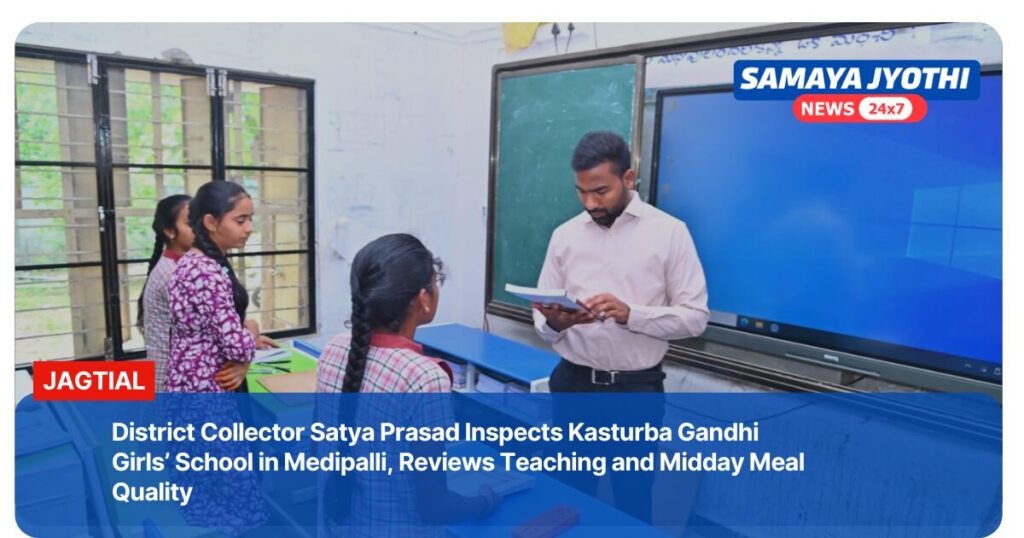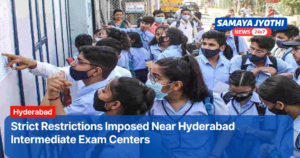- Home
- Latest News, Telangana
- Top 7 Positive Steps: District Collector’s Essential School Inspection at Kasturba Gandhi Girls’ School
District Collector Satya Prasad Inspects Kasturba Gandhi Girls’ School in Medipalli, Reviews Teaching and Midday Meal Quality
School Inspection by District Collector Satya Prasad brought renewed focus on the standards of education, nutrition, and hygiene at Kasturba Gandhi Girls’ School in Medipalli Mandal, Jagtial District. This proactive visit on [Insert Date] reflected a strong commitment by the district administration to ensure holistic development and well-being of school-going girls in rural Telangana.
A Hands-On, Student-Centric Visit
During the school inspection, the Collector didn’t just walk the premises. Instead, he sat inside the classroom with students, observed live teaching sessions, and interacted with both students and teachers using the Interactive Face-to-Face Teaching (IFT) digital panel. This form of direct, tech-enabled interaction allowed the Collector to get a genuine sense of classroom engagement, comprehension levels, and the effectiveness of digital teaching tools.
In his remarks to the teaching staff, the Collector appreciated the initiative of using IFT and urged that such tools be integrated regularly for enhanced learning outcomes.
“Students must be taught not only from textbooks but also through meaningful interaction and technology. Let learning be exciting, relevant, and inclusive,” he said.
Midday Meal Quality & Nutrition Gets Top Attention
A key part of the school inspection revolved around the midday meal scheme, which serves as a crucial nutritional lifeline for many students. The District Collector gave clear directives on maintaining both quality and quantity of the food served.
He instructed that:
Kitchen utensils must be clean, safe, and adequate.
Pulses, grains, and cooking oil must be of high quality.
Nutritious meals must be served hot and fresh daily.
Hygiene in cooking and serving areas must be strictly maintained.
He personally checked storage and utensils, interacted with kitchen staff, and tasted the food. He emphasized that every meal served must meet both nutritional standards and hygiene benchmarks.
Hygiene and Cleanliness Around Campus
During the school inspection, the Collector also toured the school surroundings. His observations led to directives on campus maintenance, including:
No stagnant water near classrooms or kitchen areas.
Regular cleaning of toilets and handwash stations.
Dustbins to be used properly and emptied daily.
Trees and plants to be maintained neatly, promoting a clean, green environment.
He stressed that a clean school is a healthy school, and students deserve a safe and nurturing environment.
Face-to-Face Conversations That Mattered
Unlike many formal inspections, this visit stood out for its interactive nature. The Collector:
Asked students about their learning experience
Inquired if they were comfortable asking questions
Checked if books, notebooks, and uniforms were being provided timely
Asked teachers about attendance and dropout rates
Such face-to-face conversations gave him real-time insights into the functioning and challenges faced by the school.
Support from Key Officials
The inspection was not a solo visit. It was conducted in the presence of:
Korutla Revenue Divisional Officer Jiwakar Reddy
District Education Officer (DEO) Ram
Mandal Revenue Officer (MRO) and other concerned officials
Their presence indicated a multi-level monitoring approach, ensuring that feedback from the Collector would be acted upon promptly by relevant departments.
Why This Inspection Matters
This school inspection is part of a broader push by the Telangana administration to enhance education standards in rural government schools, especially for girls. By targeting areas like digital learning, nutrition, sanitation, and student feedback, the government aims to:
Reduce dropout rates among girls
Improve learning outcomes
Strengthen public trust in government education
Promote girl child empowerment through education
Key Takeaways from the Collector’s 7 Focus Points
Observe Teaching Quality – Using IFT digital panels for interactive, effective teaching.
Interact with Students – Directly engaging with students to understand their needs.
Review Midday Meal Scheme – Ensuring quality food and hygiene.
Inspect Kitchen Infrastructure – Clean utensils and proper cooking resources.
Check Campus Hygiene – A clean school is essential for good health.
Review School Supplies – Ensuring timely delivery of books and uniforms.
Collaborate with Local Officials – Ensuring accountability and follow-through.
Public Reception and Expected Outcomes
Parents and locals expressed appreciation for the collector’s genuine involvement, especially as the visit showed concern beyond formal protocol. The student morale also appeared boosted by such high-level engagement.
The Collector concluded the visit by stating,
“Every child deserves quality education and dignity. We must uphold this responsibility with utmost sincerity.”
This school inspection by District Collector Satya Prasad wasn’t just a ceremonial check—it was a strategic intervention that combined ground-level observation, accountability enforcement, and student empowerment. If every district follows such an approach, government schools in India can truly become beacons of change, especially in rural communities.
As students of Kasturba Gandhi Girls’ School return to their books with renewed motivation, the impact of one meaningful inspection will ripple far beyond the classroom walls.
Click for more latest news. Also get top headlines and latest news from India and around the world at samaya jyothi










